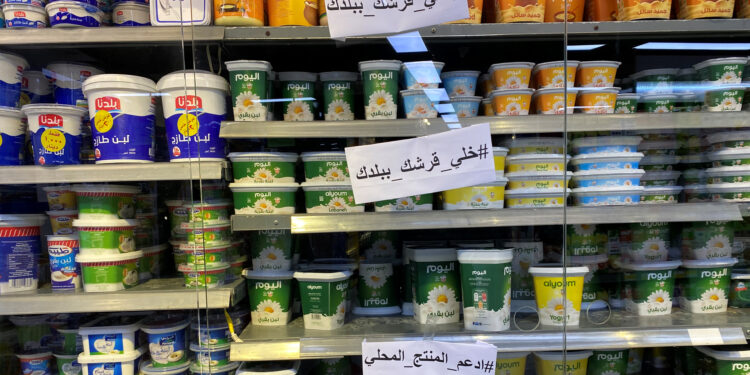The Jordanians continue their solidarity with the Gaza Strip, through protests and material and moral support, with the continuation of the Israeli aggression on the Strip, which led to the death of about 21,000 Palestinians, most of them children and women, and the wounding of more than 55,000 others, in addition to widespread destruction.
Boycotting foreign products that support Israel became one of the Jordanians’ tools to express their support for the Palestinians with the beginning of the aggression on October 7.
An idea became a principle
At the beginning of last November, the Jordanians called, through various social media platforms, for campaigns to boycott Israeli products or the products of countries that support it, in order to put pressure on stopping the aggression.
Ayman Al-Ghazawi, a merchant in the city of Irbid (northern Jordan), says, “The boycott is the least we merchants can do in support of our brothers and sisters in the Gaza Strip.”
He pointed out that the boycott has transformed from an idea into a principle, which reflects the great amount of solidarity and condemnation of the fierce Israeli attack on the besieged Gaza Strip, saying that resistance is not limited to weapons, as the economy would put an end to “Israeli arrogance and those behind it.”
Al-Ghazawi, a member of the Irbid Chamber of Commerce, pointed out that the boycott in the Jordanian governorate – which is the largest in the Kingdom after the capital – has received great and noticeable interaction, as no commercial store is devoid of its manifestations.
Youth interaction
The boycott includes American, German and British goods and brands, with great interaction among young people, and some of them go further by volunteering to raise awareness and remind them of the importance of stopping buying products that support the occupation.
Al-Ghazawi believed that the boycott had increased the level of demand for local goods, which he considered a positive thing that would develop local products.
For his part, Osama Al-Mustafa (23 years old), who works in a store, said that he noticed that most customers take the initiative on their own to order a commodity that is not produced in countries that support Israel.
He pointed out that the store owner began focusing on alternative local goods when he felt the high level of the boycott.
“In one hand”
Ihsan (47 years old) confirmed in an interview that he strongly supports the boycott, and not only the boycott of Israeli products, but also American products, considering that they are “on the same scale” and that it is “the least we can offer to our people in Palestine and Gaza.”
As a shop owner, Uday Al-Muqbel (32 years old) said: “I, my children, my mother, and my brothers are no better than those who are being killed in Gaza. Why do they target children and women? When I boycott, I am fighting Israel and the countries that support it with its economy.”
It is noteworthy that this popular boycott campaign also received support from mosque preachers, most of whom called for the importance of a permanent boycott and support of national products.
The Jordanian Consumer Protection Association did not refer to the boycott directly, but it called on citizens to buy local and Arab products, in support of them and “because of their high quality that is comparable to and competitive with foreign goods,” with moderate prices.
Its president, Muhammad Obaidat, said, “The difficult economic conditions force us to stay away from foreign goods as much as possible, if a local and Arab alternative is available at a moderate price.”
Obaidat called on merchants to be satisfied with a reasonable and fair profit margin for all parties in the exchange process, because reducing commodity prices will be an incentive to stimulate market movement and increase sales, which will reflect an increase in profits.
It is noteworthy that 91% of participants in a comprehensive Al Jazeera Net poll in the middle of this month said that the popular boycott of products and companies that support Israel succeeded, while 9% believed that it did not succeed.



